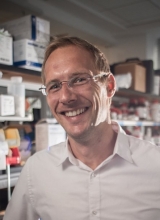CBE & MSE Seminar: Harnessing Nature’s Light Manipulation and Structure Formation Strategies for Dynamic Optical Materials

Department of Mechanical Engineering
Massachusetts Institute of Technology, Cambridge, Massachusetts
Abstract: Investigations of nature’s most fascinating light manipulation strategies can inspire design concepts for synthetic, hierarchically structured, functional optical materials and devices. While soft and fluid matter frequently enables tunable and stimuli-responsive optical characteristics in biological photonic systems, soft and fluid components still represent an underutilized class of materials in the optical engineers’ toolbox. In this seminar, I will present a selection of materials that employ bioinspired photonic architectures, implemented in soft and fluid materials, with tunable and stimuli-responsive behavior. I will discuss the application of elastic color-tunable photonic fibers in stretchable optomechanical sensors for pressure determination in compressive medical textiles and the design of dynamic optical materials using micro-scale emulsion droplets with controlled internal morphology. In addition, I will argue that insights in the formation of functional biological materials can be beneficial for informing synthetic materials and device fabrication strategies. Taking butterfly scale formation as a specific example, we aspire to understand the role of mechanical phenomena in biological structure formation processes. We hope that our efforts will advance our understanding of the biomechanics underlying structure formation and reveal opportunities for tailoring cellular processes to create custom material structures, adapt cellular principles for synthetic fabrication strategies and ensure intimate control of hierarchical material structures across all length scales.
Bio: Mathias’ research focuses on the identification of unique biological light-manipulation concepts and the development of bioinspired, adaptive and actively tunable micro-optical devices. Through experimentation and optical modeling, and by employing a diversity of manufacturing principles including self-assembly and unconventional thin-film processing techniques, his group is developing novel optical technologies. He joined the faculty of MIT in November 2013. Prior to that, Mathias held a Feodor Lynen research fellowship of the Alexander von Humboldt - Foundation for postdoctoral studies at the School of Engineering and Applied Sciences of Harvard University, where his research was focused on bioinspired photonics, bioimaging and optical spectroscopy. He earned his degree in physics from the Saarland University in Germany and the University of Lorraine (formerly Henri Poincaré University) in France in 2006. Mathias then continued his graduate studies at the University of Cambridge in the UK at the Cavendish Laboratories, where he received his Ph.D. in 2010.
Host: Alon Gorodetsky
